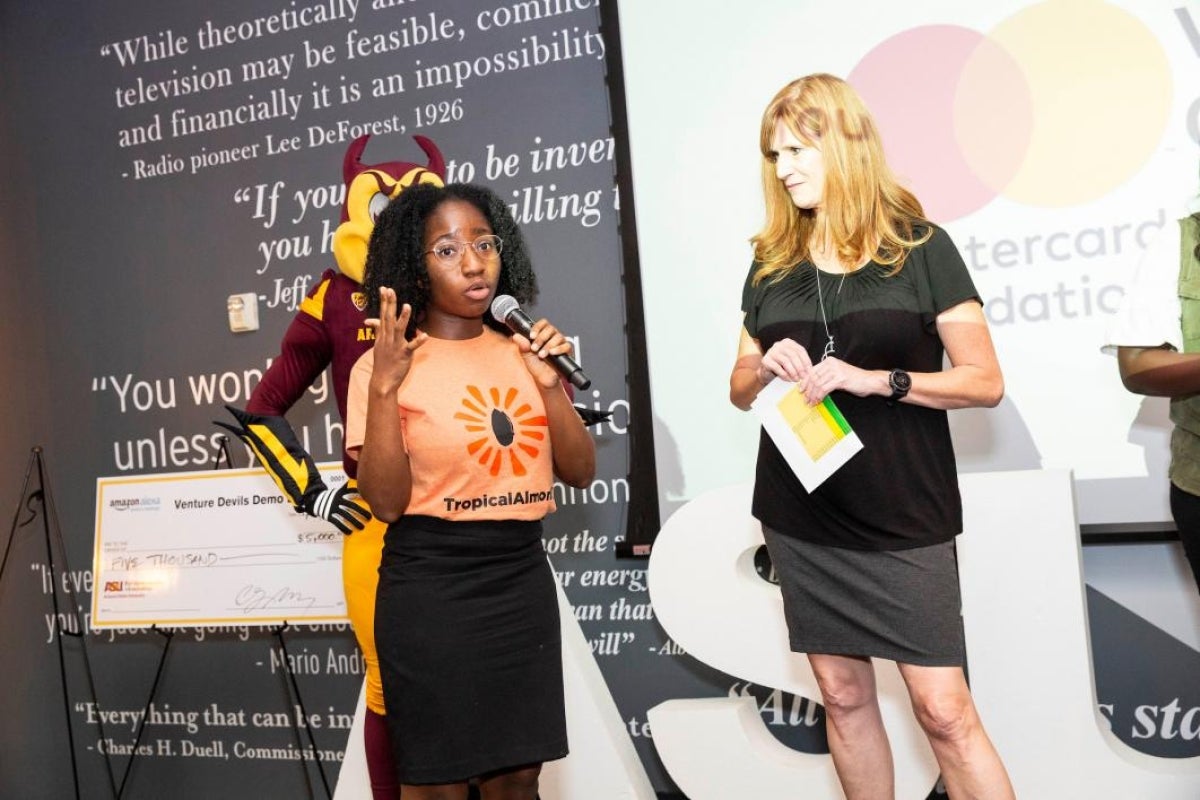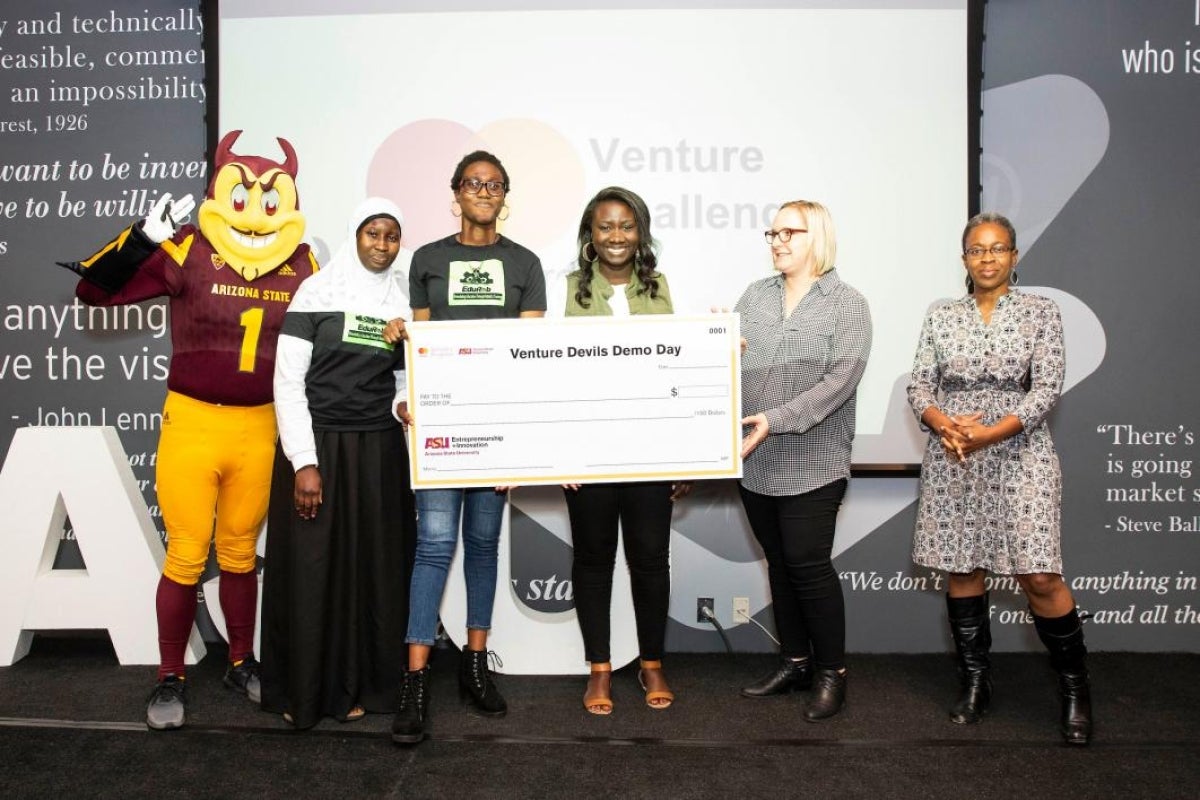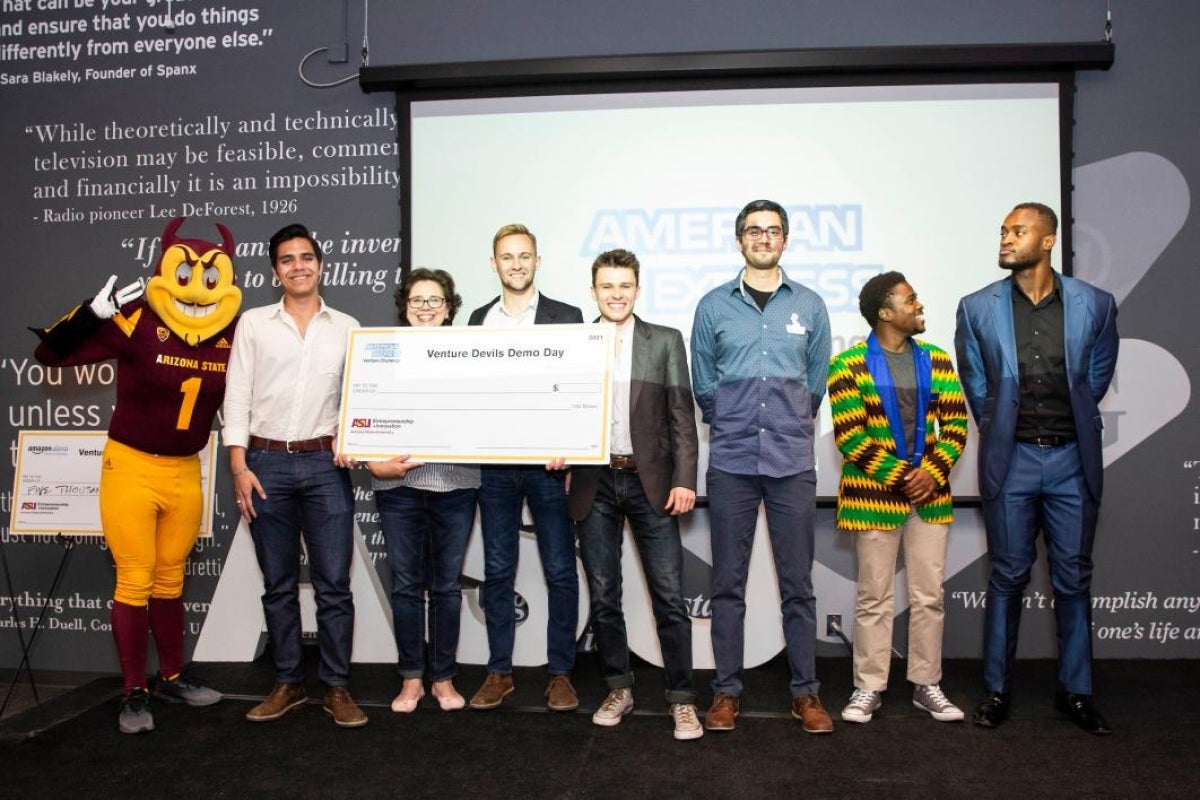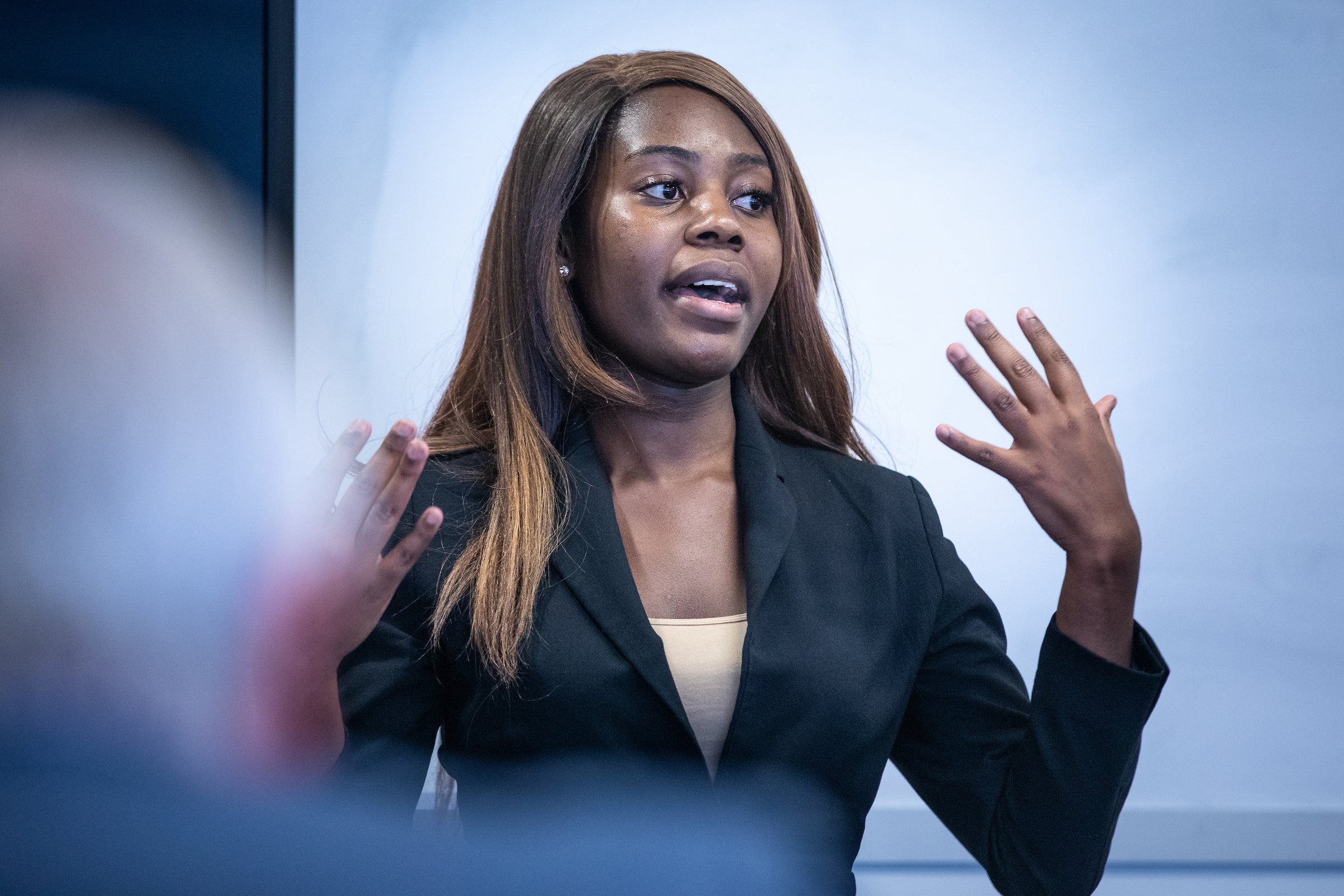ASU entrepreneurs win thousands of dollars for problem-solving ventures

Editor's note: This story is being highlighted in ASU Now's year in review. Read more top stories from 2019.
Dozens of eager entrepreneurs in the Arizona State University community came together on Friday to pitch their ideas and solve problems that ranged from inconvenient to deadly serious.
REACT is a group of students who provide education and medical care to refugees in Phoenix. The Packed App aims to cut the time that restaurant patrons wait for their server to close out their bar tab. Suntaa Shea Company is working to end the exploitation of women in Ghana and empower them to make a living. Streamwork is a platform that connects students to peer tutors at night after the tutoring center closes.
They were among 80 ASU-affiliated startups that won nearly $200,000 in investment funding and services at the Demo Day entrepreneurship competition on April 19. The projects are part of Venture Devils, a program in the office of Entrepreneurship + Innovation at ASU that provides space, mentorship and access to funding to ASU students, faculty, staff, alumni and community members. The teams pitched their ventures to a panel of judges in nine funding competitions at the daylong event, held at SkySong in Scottsdale.
Some of the ventures have already reaped tens of thousands of dollars in grants or investments from previous pitch competitions. Pablo Guimera Coll, a PhD student in materials science and engineering at ASU, is cofounder of Crystal Sonic, a company that uses sound waves to more precisely cut silicon wafers for the technology industry.
Coll told the judges that traditional laser cutting of wafers produces a lot of waste.
“We have a much better solution — apply sound waves to cut the wafer, which is 10 times faster and reduces the defects,” he said. His method also is cheaper.
Crystal Sonic has received more than $300,000 from the Department of Energy and the National Science Foundation. On Friday, the venture was one of the big winners, receiving $20,000 from the Edson Student Entrepreneur Initiative.
Other ventures are just getting launched. Jared Hsu, a senior majoring in technological entrepreneurship and management, created StreamWork, a platform that connects students to peer tutors with a whiteboard technology that allows them to see a problem being worked out.
Hsu attends the Polytechnic campus, where the tutoring center closes at 5 p.m.
“So procrastinators like myself have no one to turn to in the middle of the night when we need help,” he said.
StreamWork users will get one free month and then pay a monthly subscription, with the student tutors also getting paid.
Hsu said he has partnered with the Poly tutoring center in a soft launch during finals week next month.
“So the tutors are vetted by ASU,” he said. “We hope in the fall semester to be fully established in the tutoring center.”
ASU student Sophia Collier describes Sotra Fashion, her line of modest clothing, to the judges at Demo Day on Friday. She had her first fashion show last week. Photo by Charlie Leight/ASU Now
Another student-led venture that’s already finding success is Sotra Fashion. Sophia Collier, a junior majoring in technological entrepreneurship and management, founded the fashion line of modest clothing — which already has made $8,000 in sales — after visiting a mall with some Muslim friends and realizing much of the clothing was crop tops and ripped jeans.
“There wasn’t a lot of modern, modest fashion available to women that’s affordable and that works in the summer,” she said.
The Sotra website sells flowy, long-sleeved jumpsuits and colorful dresses in the $50 range. Collier had her first pop-up store and fashion show on campus last week.
“We want to be creative and don’t think that modesty should limit you,” said Collier, who said she’s using student designers to create some of the pieces. She won $15,000 in the Edson Student Entrepreneur Initiative.
One new competition this year was the Scholar Entrepreneurship Fund, for students from Africa who are studying at ASU as Mastercard Foundation Scholars. Their ideas are for projects to make a difference in their home countries.
Shantel Marekera is cofounder of Little Dreamers Preparatory Academy, a subsidized preschool in her native Zimbabwe. Many organizations offer scholarships for primary and secondary school, but few offer aid for preschool, said Marekera, a graduate student in justice studies who recently became a Rhodes Scholar.
“So many families send boys to school but not girls,” she said. “I believe preschool is the most important foundational process in a child’s development.”
Shantel Marekera, is cofounder of Little Dreamers Preparatory Academy, a subsidized preschool in her native Zimbabwe. She pitched her venture to judges at Demo Day on Friday and won $5,000. Photo by Charlie Leight/ASU Now
Her school, which launched in January with a handful of children, teaches computer literacy and French.
“We want to create this dynamic group of students to be innovative from a tender age,” said Marekera. Her venture won $5,000 in the competition, which will go toward the purchase of a minivan so more students can attend the school.
Godfred Naah, a scholar from Ghana who is pursuing a bachelor’s degree in business administration, won $6,500 for his venture, the Suntaa Shea Society.
Naah explained that in rural Ghana, women pick the seeds of the shea trees that grow wild, but then have only the option of selling to middlemen, who underpay them.
“Our solution is to open a shea butter processing center, and we will buy the shea kernels from the women at higher prices and also employ them to process the kernels,” he said.
Shea is processed for cooking oil and also for use in cosmetics and candy.
“This will empower the women and give them more options,” he said.
Other winners in Demo Day included:
• REACT, a group of ASU students who have partnered with Mayo Clinic to offer primary care and culturally sensitive education to refugees in Phoenix, won $20,000 in the Pakis Social Entrepreneurship Challenge. The money will allow the group to expand clinical operations. REACT stands for Refugee Education and Clinic Team.
• LabRat, an app created by undergraduate students Will Mabrey and Austin Smith that’s like a matching service for labs and study subjects, won $5,000 in the Ashton Family Venture Challenge. Users fill out a form and the labs can draw from a wider pool of subjects, while subjects get paid for participating in studies.
• HAT-TAC, a customizable hat storage and display hanger invented by Domenic Fotino, who earned a degree in technological entrepreneurship and management, won $5,000 in the eSeed competition.
CJ Allen, an ASU graduate who works at Amazon, was a judge in the first-ever Amazon Alexa The winners, which both incorporated voice technology, were Avontage, a platform for small business owners, and DXOrders, a platform that connects doctors and patients. Venture Challenge, which gave $5,000 each to two teams.
“I’ve done these pitches, and I heard ‘no’ a hundred times before I heard ‘yes,’” he told the crowd during the awards celebration.
“The pitches we saw today were amazing. I saw passion and innovation, and there aren’t many colleges that have access to this.”
Top image: Pablo Guimera Coll, a PhD student in materials science and engineering at ASU, tells the judges about his company, Crystal Sonic, which uses sound waves to more precisely cut silicon wafers, at Demo Day on Friday at SkySong in Scottsdale. Photo by Charlie Leight/ASU Now
More Business and entrepreneurship
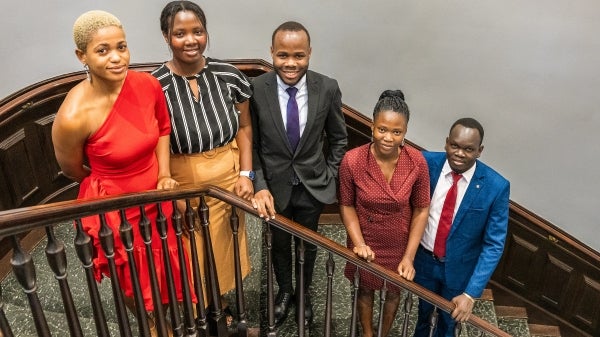
Cohort of Mastercard Foundation Scholars poised to become AI leaders in Africa
Arizona State University is celebrating a significant milestone in expanding the university’s global access mission by welcoming the newest cohort of Mastercard Foundation Scholars, who will…

Networking event turns pitches into partnerships
Perfect timing, quick decisions and electrifying energy are vital aspects of both startup ventures and auctions. In an environment where every moment matters, everyone is searching for the deal that…

Thunderbird at ASU, W. P. Carey School team up on concurrent master's degrees
Students are now able to take advantage of two world-class schools at Arizona State University, at the same time. The Thunderbird School of Global Management and W. P. Carey School of Business…
